I hoped that during our stay in the capital we would meet some more friendly locals. Unfortunately, our CouchSurfing contacts failed and we went to one of the popular hotels in the central Piaza neighborhood, effectively putting a wall between us and the local people.
The city itself did not impress us in any way. Even a bunch of big buildings and wide avenues in the center did not change our perception that Addis Ababa was just an overgrown village. I found it so uninteresting that my camera remained idle for all the time spent there. The only areas worth taking a photo were markets, but the stir caused by appearance of white faces, manifested by omnipresent farenji word, discouraged me from trying. Having a natural photo there would be hardly possible, and I just gave up.
The more annoying, however, was the necessity of constant vigilance. While waiting for traffic lights to change, I caught a hand trying to snatch my mobile phone from a pocket. The owner of the hand was a 10 years old tissue seller. I refrained from beating the kid seriously and just slapped his head once. Perhaps I was too good, as the wannabe thief, together with his friends started to beg for money just a few seconds later. The passing people did not pay attention to the attempt of thievery, just someone ordered the boy to collect the tissues which had fallen on the ground. For me it was just another proof of racism – a white man is like a walking cash machine. He draws attention of all the beggars, but also he can be cheated or robbed and nobody cares.
Our stay at the hotel was interrupted by a two-day camping at the German embassy. Checking WarmShowers we found a German-British couple, who agreed to host us despite our last-minute call. Regina and Anthony, together with their little son Connar, live in a tranquil, green embassy compound. They let us pitch tents in the garden, as the spare room had already been occupied by an unusual guest.
Many people told me that going on a bicycle to Africa was very brave. Maybe they are right, but still there is a plenty of space to push the limit. Imagine that you cross that continent being a blue-eyed blonde girl. Crazy enough? Then meet Brenna, who cycled from Cape Town to Addis Abeba, most of the time alone! Forgive me, please, the lack of a photo together. I was just too impressed!
Our embassy tour continued. At the Polish one I met with the ambassador, who had offered to help with getting my important things being brought over from Poland. He had two news for me. The good was that the package would arrive. The bad, that it was going to be there two weeks later than expected. We had to make a plan, as staying in the city was not an option.
Thinking about the possibilities, we visited the embassy again for Easter celebrations. In a small group of Polish staff and residents we had delicious Polish food. After weeks of eating injera and two days after my first food poisoning (old fruit juice), my stomach got shocked. Delicious, home-made dishes like żurek, bigos and pasztet were followed by a variety of cakes, come even with real chocolate. I guess for Alex it was even more impressive, to try traditional Polish food in the middle of Africa!
Finally leaving Addis, we went by a side road through hills, before descending into the Rift Valley. That saved us from cycling the most busy road stretch in the country, which goes south from the capital.
On the first night it rained a lot. The hotel we had stopped at, as well as the village, had no running water. That was, however, the first place where I saw Ethiopians collecting rain water, even though it was not enough for enjoying a shower. In a nation which suffers from water shortages every year the onset of the rainy season should fill tanks and solve the problem. But not here.
In Ethiopia women and children take big plastic canisters and set out for long walks to collect water. There are two main sources: streams which carry rather liquid mud than anything potable, and pools on the pastures. Perhaps water with minerals or spiced by cow dung is more tasty and healthy? Although a half of the houses in rural Ethiopia are roofed with corrugated iron, perfect for collecting water, nobody does it. There are no rain gutters, no single water tank, nothing. It seems just too complicated or it is just not a part of the tradition and therefore not accepted. However, begging cyclists for water seems to be perfectly fine.
About two weeks earlier we had arrived to a hotel in the evening. It was
raining. We asked for a shower and heard that there was no water.
“You should catch the rain”, Alex said.
“Catch the rain? Hahahahahahaha!!!”, the manager laughed as if she had heard
the best joke ever.
There we come to the saddest part of Ethiopian mentality: no will of change.
That was confirmed two days later by an Ethiopian, whom we had met at a
restaurant.
“You know what is the biggest problem of Ethiopia? Zero creativity”, he
admitted openly. “We have great land, natural resources, but Ethiopia is still
poor. Just because people have no ideas what to do.”
That open criticism of his own nation confirmed my previous assumptions. The country, which had very little contact with outside world for a few ages, was never conquered by anyone. The conclusion, perhaps, is that they are doing a perfect job then and no improvement is needed.
Unfortunately, the begging we witnessed is not just an internal problem. Ethiopia, as a country, is an international beggar. The foreign aid amounts to over 10% of the GDP. If that stopped, the people would die of hunger in millions. And despite the aid flowing into the country, they still often do. The scale of the problem might be better drawn by the interesting article on begging in Ethiopia, also written by insider and remarkably lacking any constructive conclusion.
Although there is not enough food, the number of children in average family is perhaps bigger than in Egypt. Even though there is enough arable land, the poor techniques cripple its' productivity. We heard a story of German aid package consisting of tractors and harvesters given to Ethiopia to replace oxen. All of them work Sudanese fields now, where they were sold immediately. The government does not help too, as the constitution makes it the sole owner of all the land in the country. Peasants who do not own their fields also do not care about them. The results are appalling.
While coming to the edge, from which we would descend to the Rift Valley, we had to cope with stone throwing again. A little boy picked a rock almost the size of his head and wanted to throw it at Alex. I veered off the road, aiming at the bastard. He ran away, followed by stones thrown by me. Two adult women, who witnessed the incident, just laughed stupidly. Other adults appeared soon, but no one seemed to perceive the kid's behavior a s bad. I crossed the ditch to talk with them and the man being closest to me just ran away. A wild land settled by wild people...
The bottom of the valley welcomed us with more arid and flat land. And with other stone throwers. One of them, whom I chased away, tripped over a stone and fell headfirst on the ground. Getting up and rushing away in panic, he dropped a whip. That tool became useful on the further way. Whenever the beggar kids became aggressive and tried to grab the bike, I swung the whip and made them escape. That was the first step in effective communication with local people.
Although lakes are the main attraction of the valley, we just visited one of them. Perhaps just because they are too much of attraction. Paid beaches and lodges charging tens of dollars per night are no fun. Lake Awasa, on the shore of which a city of the same name sits, offered beautiful sunset scenery. Good for having a beer, for which we had worked very hard. The presence of Yves, a Belgian we both had met before in Egypt and who had contacted us together, was a good excuse to drink a bit more. Nothing strange that the next day we reached our destination in Dila well after the sun had set.
The next part, as we had researched, was the last mountain range on our way. Climbing back to 2500m sounded like no challenge, but we had not predicted how steep it would be and how often we would lose hard-gained altitude to cross another valley. We reached the peak exhausted and in rain. Village kids and even adults helped us, pushing the bikes despite our loud protests. They were so excited that they almost forgot to beg.
Had there been less people and villages, the area would have turned into impenetrable jungle in just few months. The south surprised us with its' lush greenery and delicious fruits being sold by roadside vendors. Our basic snack, I mean bananas, was spiced up by something new – pineapples.
While the mountains were crowded, the population seemed to be distributed evenly. There were no gaps between villages and one blended into another almost seamlessly. The only visible difference would be a change in the produce available for sale. Bananas gave way to construction wood, then to pineapples, stone blocks, chickens... In a village producing stone it was impossible to find a banana, as well as there was no wood in a pineapple one. That endless row of houses, usually inhabited by numerous children, meant listening to another million of “you, you, you”, but absence of bigger towns also brought lack of hotels. For the first time in Ethiopia we had to find something else.
Our choice was a school. The building stood in the middle of a meadow, some 200m from the road. Before we reached it, about thirty children had gathered from nowhere and followed us. After few minutes there was over a hundred. And nobody else, as we brilliantly chose the school as sleeping place just in the middle of Ethiopian Easter.
Finally, the crowd alarmed a teacher. He offered us to stay in the teachers' compound on the other side of the street. While we began to pitch the tents, a crowd of children gathered behind the fence, ordered not to enter inside. The rising pressure, however, made smaller ones diffuse between bars. Then the bigger ones followed, and fifteen minutes later the crowd surrounded the tents and looked at every single of our moves.
After a supper at the village we prepared tea for the teachers. Short talk followed, during which I asked for the number of students the school was hosting. Two buildings with eight classrooms in total were used for... three thousands children! And that was a provincial school in a village, which name nobody would recognize only 30km further.
In the morning, while we rolled completely wet tents, a cyclist came from the other direction. Victor had sold his house in Switzerland and embarked on a round-the-world trip. Africa was his fourth continent after Europe and both Americas.
As the downhills finally outnumbered uphills, the landscape changed again. First we crossed cone tree forest (first one since Turkey, perhaps) and then entered red-soiled land, dominated by acacia and termite mounds. A floor at almost empty road construction base was our camp for the next night.
The following day was the last of cycling together with Alex. Our destination was the town of Yavello, where we would separate. The road descended lower and lower, to a valley which obviously had fallen victim to numerous flash floods. Signs saying that NGO this-and-that funded a dam, a water reservoir or a well dotted the roadside densely. We reached a tiny settlement, where there were more signs than houses. From one of them a group of women rushed to the road, and one picked a huge stone and took aim at Alex.
We stopped immediately and greeted locals in a way resembling their customs as much as possible. The bombardment with stones we inflicted on the yard made the women run for cover behind the house. For me it was a clear message, which I feel obliged to pass to the helpful West: there had been too much aid sent to Ethiopia and it should be stopped immediately. Just to feel reassured, we were greeted with a bunch of insults by women carrying firewood some few hundred meters further down the road. Of course I do not know the language, but the tone and clenched fists made me sure that it was not a friendly greeting.
Finally we reached Yavello at the peak of Easter celebrations. That meant closed shops, open bars and drunk men or prostitutes trying to get our attention constantly on the main street. We quickly found a mission of Norwegian Lutheran Church, where the friendly pastor Gezzahin arranged a camp site on a roofed verandah of a Scandinavian-style wooden house. He also invited us home for a delicious injera and agreed to keep my bike for over a week.
On the next morning we said good luck to each other and Alex cycled towards the border, while I managed to find a car going to the capital.

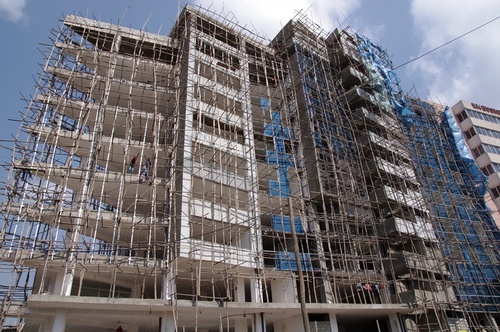
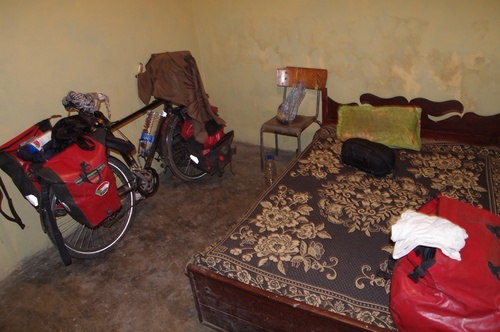
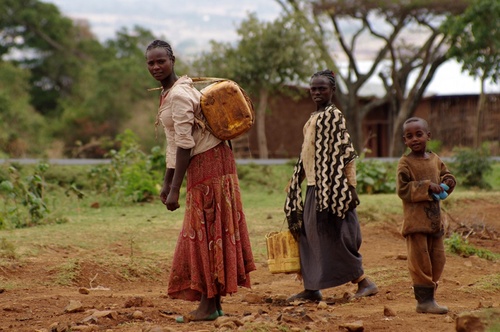
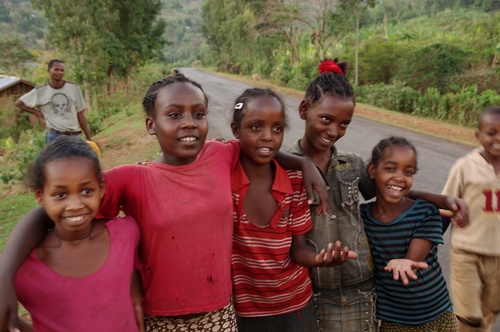
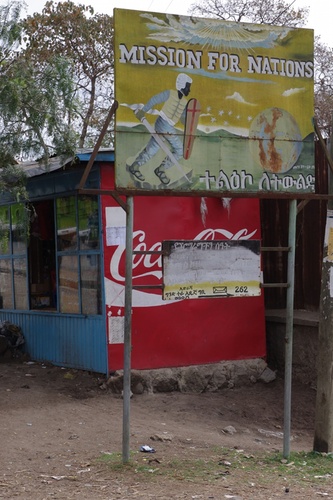
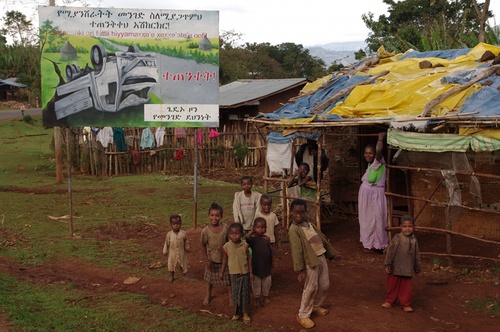
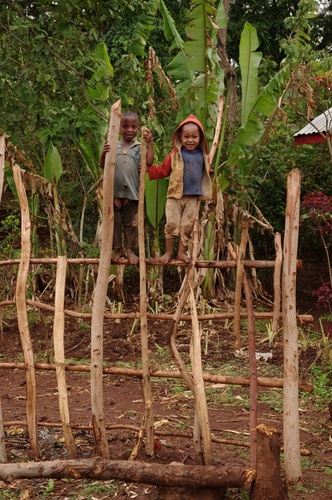
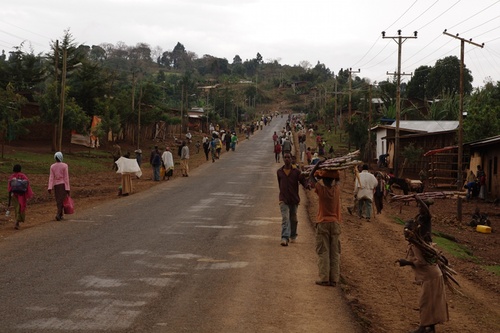
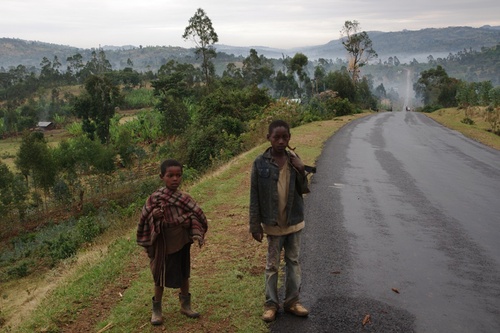
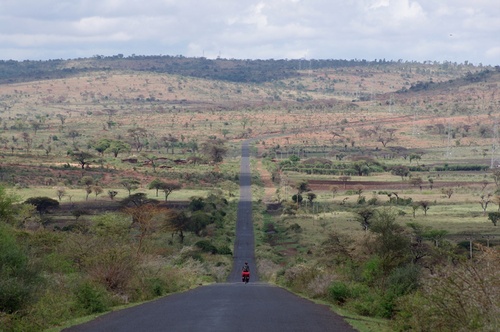
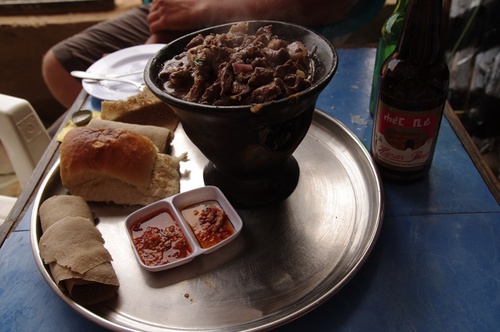
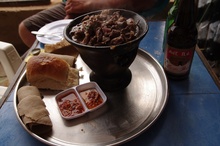
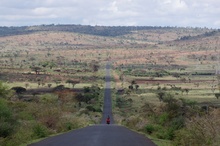
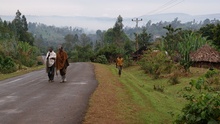
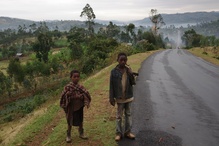
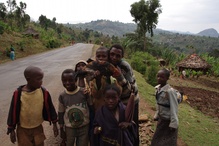
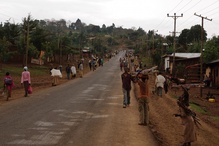
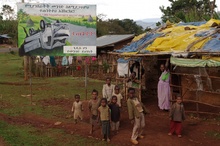
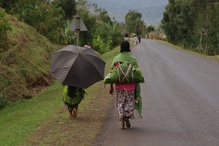

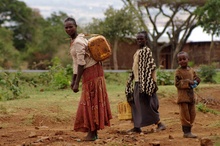
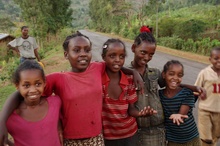

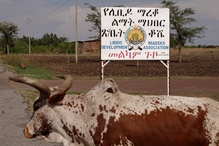
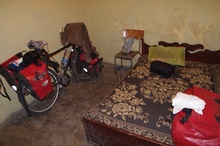
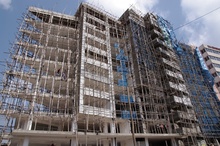
Comments:
hdk
prawdopodobnie dobre rozwiązania i problemy obecnego sposobu rozwoju Afryki opisano w 'małe jest piękne' Schumachera
Andrew
Michał
wieho
Fajnie się czyta i czekam na kolejne wpisy (a czytam od samego początku)
Pozdrowienia z Lublina
wieho
Ciosna
Trzeba mieć niesamowicie dużo uporu i hartu ducha by przebić się przez to.
hose morales
Nie ma lekko, hardkor rzekłbym nawet heh:)
Nie można życzyć nic innego jak wytrwałości!
yves
Wow, Michal, happy to know what was the end of your Ethiopian story, cause i arrived in Addis a bit late comparing what we planned together so i tried to phone you but obviously too late. In a way , i was happy for you regarding your experiences and your wish, meaning you had passed a so lovely country for you ((;
your last sentences group was as much funny as amazing and representative of your mind after those kind of ''adevntures''.
by the way, i also have to say that your vision depanding your bicycle trip, is different from mine on many points, travelling by bus, not so deep and 'wild' than you in the country.
First one is the greeted locals customs with stone and rock. otherwise the 'farengi' ATM or the instinctive reflex to beg have been seen also for me as an institution.
but generally i liked your analys of the global situation.
i hope your are not disgusted by this country because it would be also unfair for all the other specific sides, and the others interests (for example extra human ((; ) , and even for the majority who don't beg neither stone-attacked.
hope moreover that you keep hope and heart forward cause your trip is not so much toward the south than toward the people and toward yourself.
hope finaly that ours ways could cross themselves another day in another place.
ciao, have fun and beautiful feeling and good win, good roads(or ways) and good rools.
yves